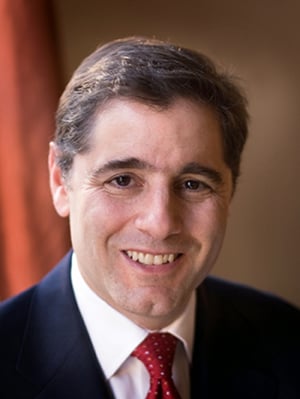FCC Proposing Powerful, Massive Public WiFi Network
In what is already a hotly contested issue that will no doubt end in a high stakes showdown, the FCC and its chairman Julius Genachowski (pictured), is proposing a large-scale, free public WiFi network that would be more powerful than current home and office WiFi networks, according to the Washington Post. Essentially, these WiFi networks could allow people from all economic levels to access the Internet without paying for in-home service, and users of all stripes could use the WiFi to make phone calls and surf the Internet without paying for 3G or 4G service from a wireless carrier.
Unsurprisingly, the likes of AT&T, T-Mobile, Verizon, Intel, and Qualcomm are staunchly opposing the proposed plan, because such a disruptive shift in the mobile market would likely seriously impact their bottom lines, not to mention their business models. It’s a tough pill to swallow if the government makes a decision that kicks your business in the teeth.
 These companies and others also bring up some very good points regarding the potential wireless traffic problems that will no doubt arise, but their concerns are ones that should be alleviated with a bit of ingenuity and strong testing--they don’t provide a compelling case that it’s actually a bad idea to roll out a WiFi network for the public’s use.
These companies and others also bring up some very good points regarding the potential wireless traffic problems that will no doubt arise, but their concerns are ones that should be alleviated with a bit of ingenuity and strong testing--they don’t provide a compelling case that it’s actually a bad idea to roll out a WiFi network for the public’s use.
Consumers will more than likely take the opposite view, which is shared by Google, Microsoft, and other tech companies, that such a public network would encourage innovation and wreck some of the expensive and binding means of getting Internet access. Companies such as Republic Wireless, which is beta testing an unlimited everything wireless plan that costs a fraction of what the big mobile carriers charge, could be huge winners here.
We’ll save you the trouble of pointing this out in the comments, but many will also be concerned about the government controlling so much of the nation’s Internet access. Plenty og others will be unhappy about how much money the government would spend on such a venture, when the FCC could auction off that spectrum to private companies and dump billions into the government’s substantially depleted coffers.
Whatever the concerns about a large-scale, powerful public WiFi network might be--legitimate and otherwise--it’s a fact that this type of network would change the face of the U.S.; disrupt some businesses and business models; and create a wide path for new businesses, products, and services to take hold. It also fits with the FCC’s plans for increasing broadband penetration throughout the U.S.
Unsurprisingly, the likes of AT&T, T-Mobile, Verizon, Intel, and Qualcomm are staunchly opposing the proposed plan, because such a disruptive shift in the mobile market would likely seriously impact their bottom lines, not to mention their business models. It’s a tough pill to swallow if the government makes a decision that kicks your business in the teeth.
 These companies and others also bring up some very good points regarding the potential wireless traffic problems that will no doubt arise, but their concerns are ones that should be alleviated with a bit of ingenuity and strong testing--they don’t provide a compelling case that it’s actually a bad idea to roll out a WiFi network for the public’s use.
These companies and others also bring up some very good points regarding the potential wireless traffic problems that will no doubt arise, but their concerns are ones that should be alleviated with a bit of ingenuity and strong testing--they don’t provide a compelling case that it’s actually a bad idea to roll out a WiFi network for the public’s use.Consumers will more than likely take the opposite view, which is shared by Google, Microsoft, and other tech companies, that such a public network would encourage innovation and wreck some of the expensive and binding means of getting Internet access. Companies such as Republic Wireless, which is beta testing an unlimited everything wireless plan that costs a fraction of what the big mobile carriers charge, could be huge winners here.
We’ll save you the trouble of pointing this out in the comments, but many will also be concerned about the government controlling so much of the nation’s Internet access. Plenty og others will be unhappy about how much money the government would spend on such a venture, when the FCC could auction off that spectrum to private companies and dump billions into the government’s substantially depleted coffers.
Whatever the concerns about a large-scale, powerful public WiFi network might be--legitimate and otherwise--it’s a fact that this type of network would change the face of the U.S.; disrupt some businesses and business models; and create a wide path for new businesses, products, and services to take hold. It also fits with the FCC’s plans for increasing broadband penetration throughout the U.S.

